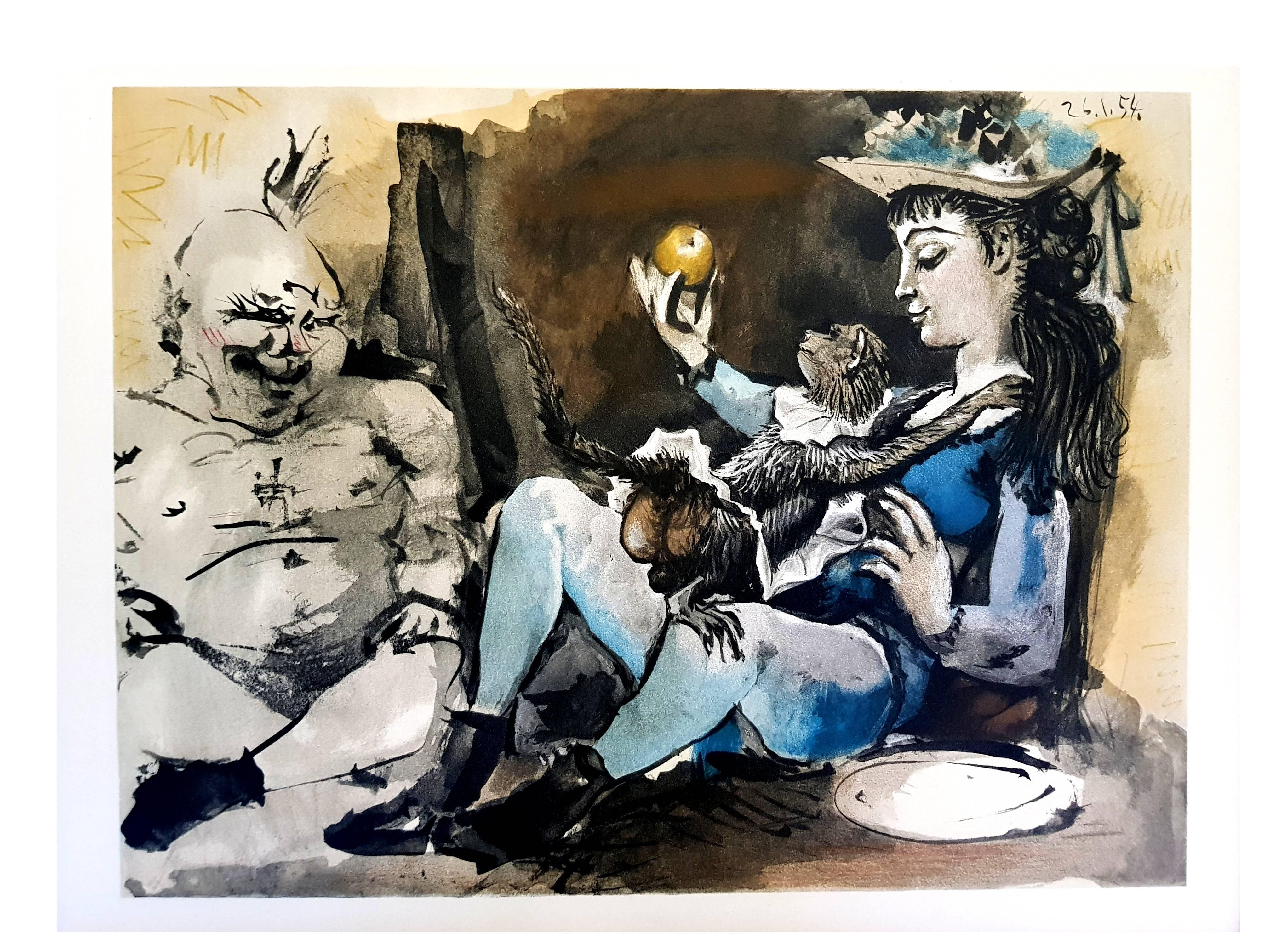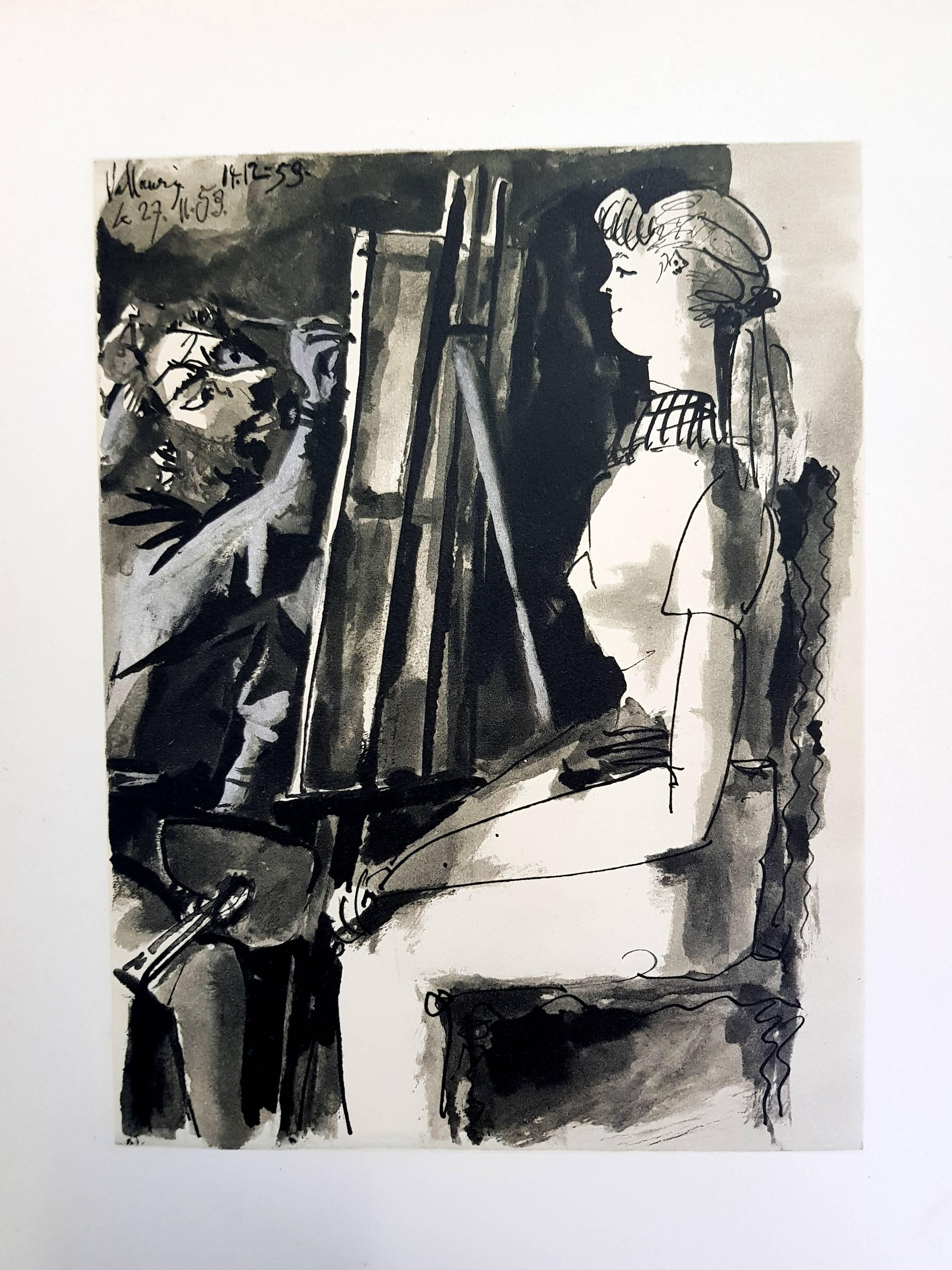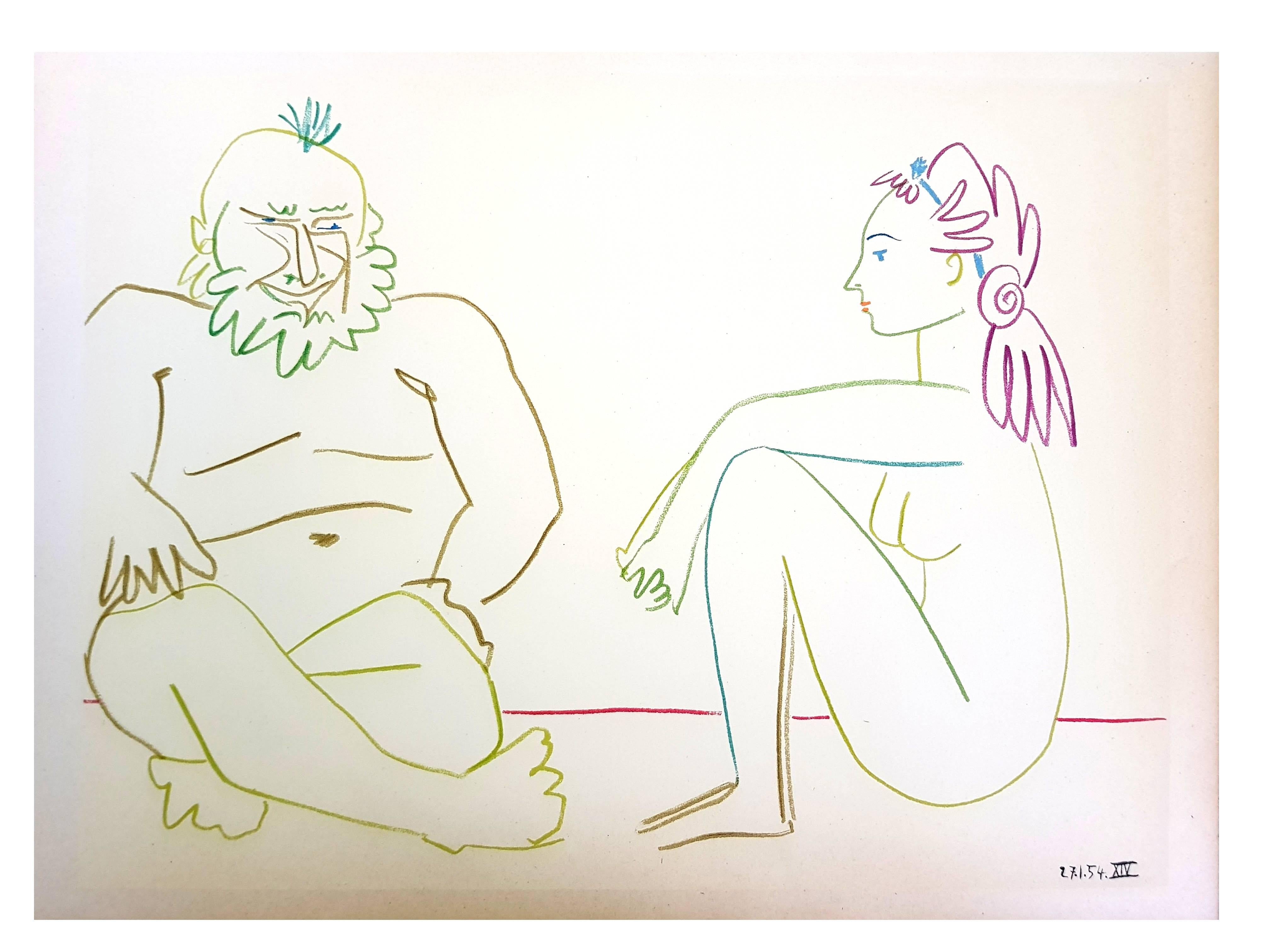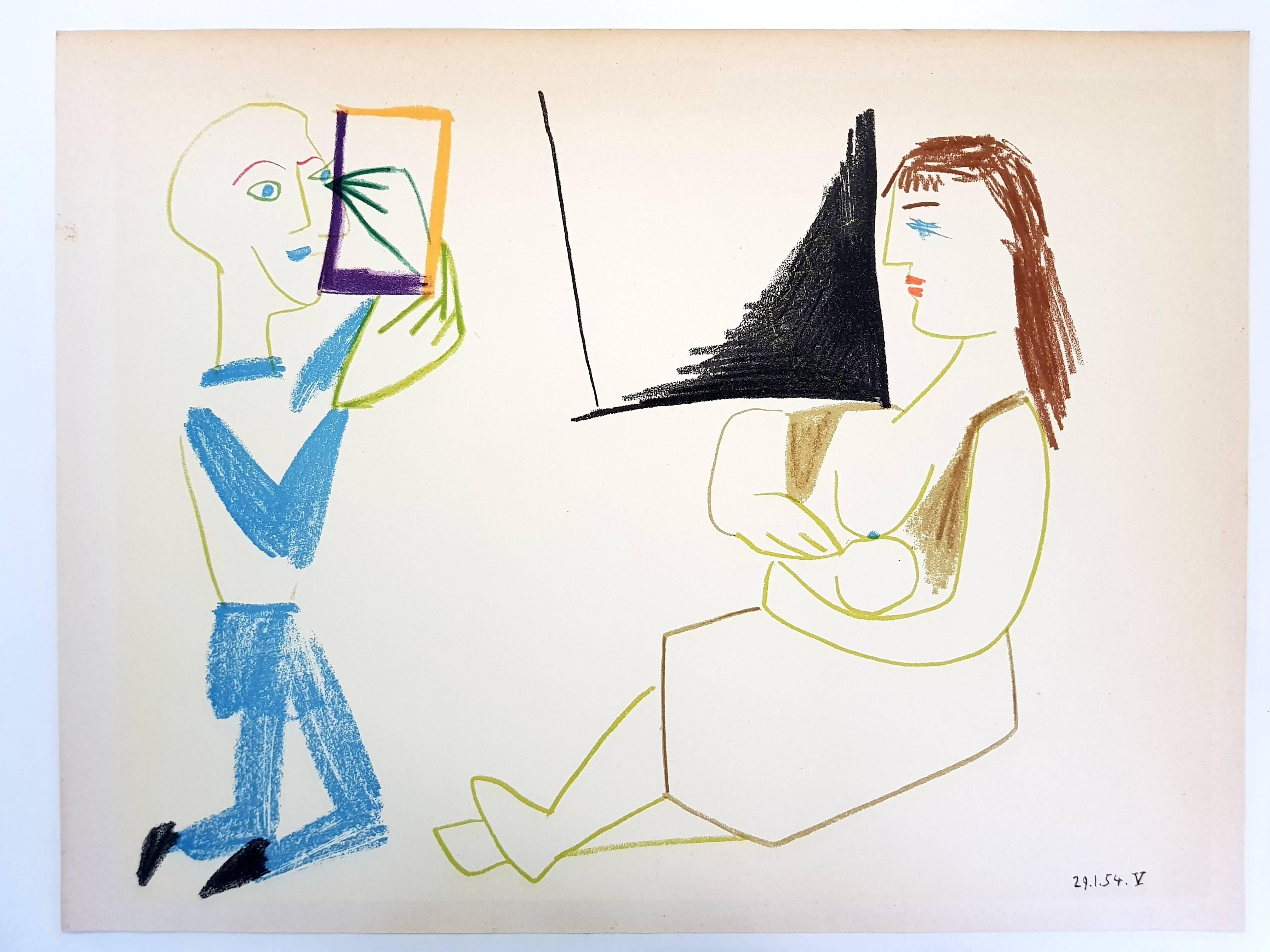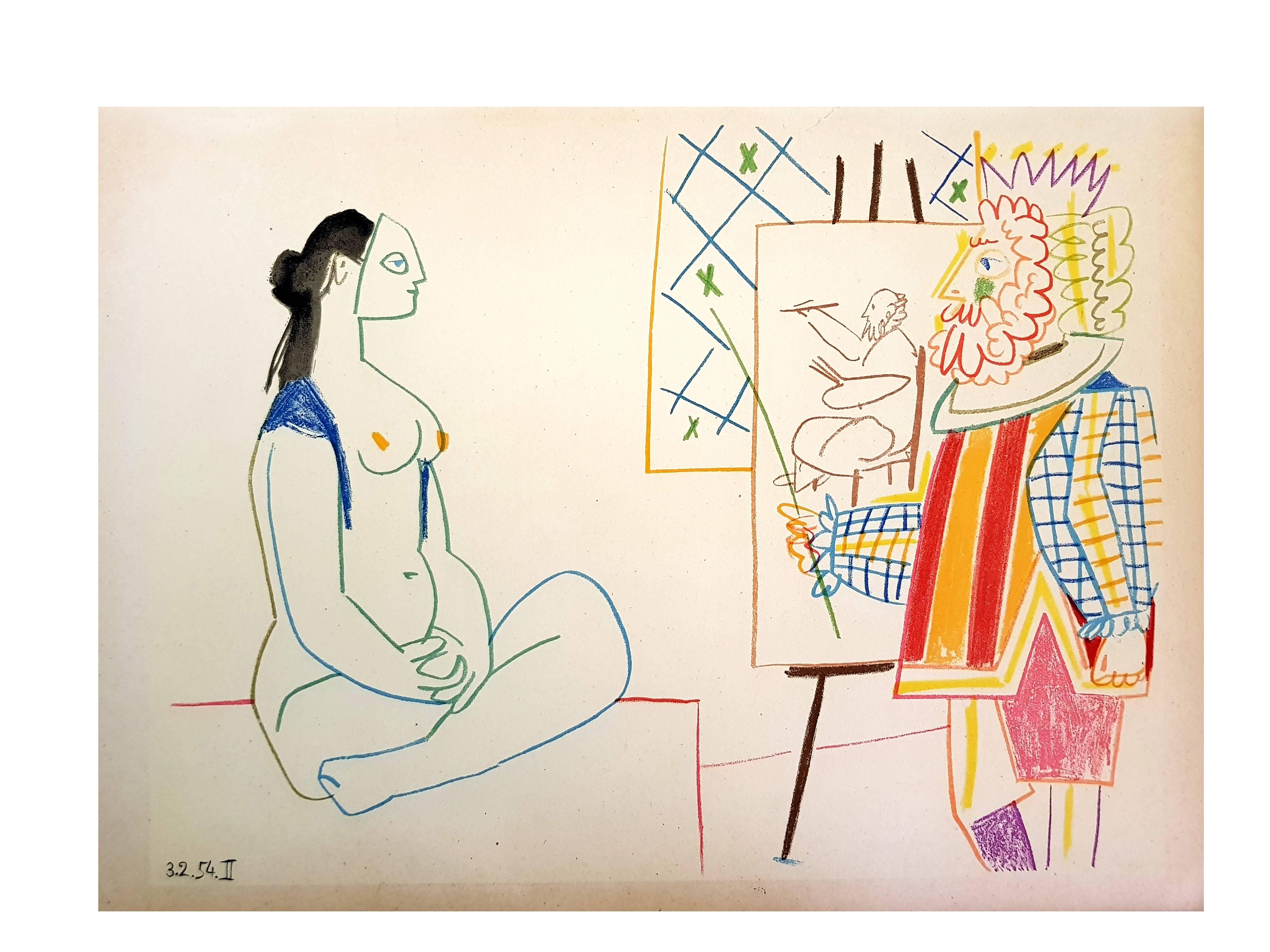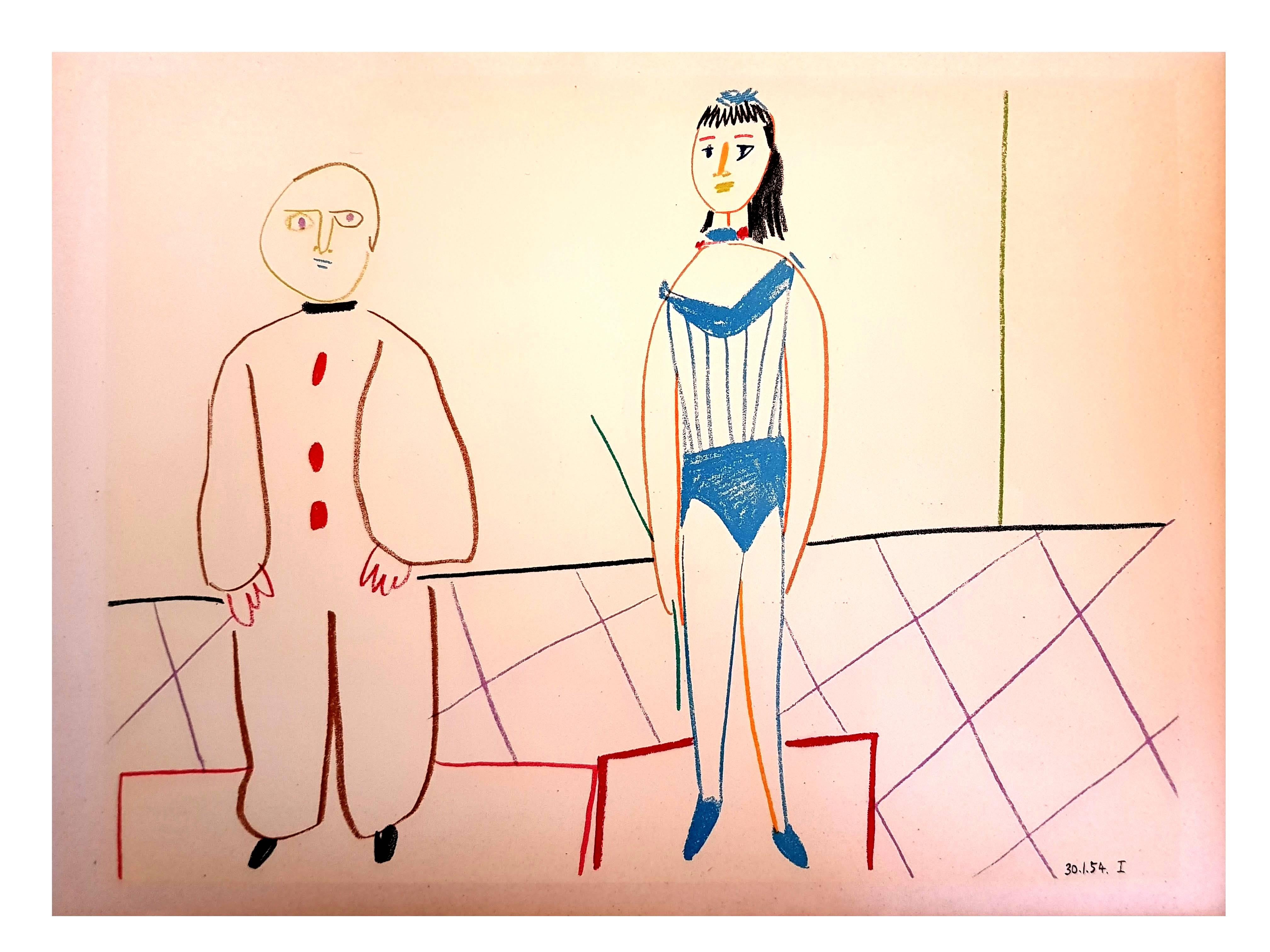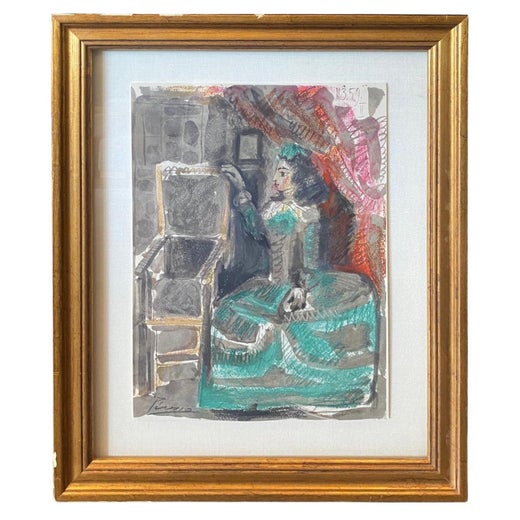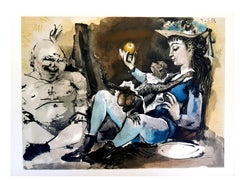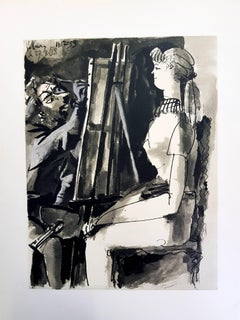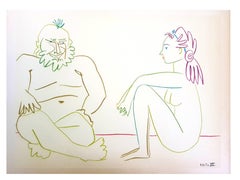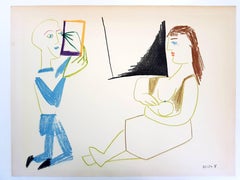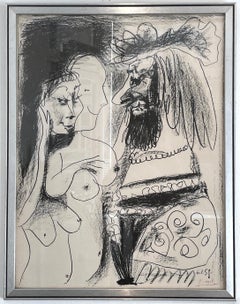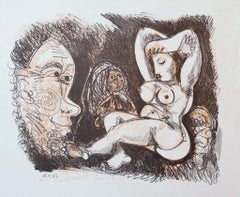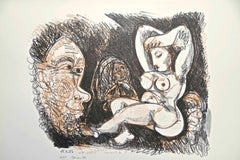Items Similar to The Human Comedy - Lithograph
Want more images or videos?
Request additional images or videos from the seller
1 of 6
(after) Pablo PicassoThe Human Comedy - Lithograph1954
1954
$1,538.31
£1,160.36
€1,300
CA$2,158.51
A$2,353.82
CHF 1,236.52
MX$28,211.94
NOK 15,680.32
SEK 14,592.02
DKK 9,903.76
About the Item
After Pablo Picasso
The Human Comedy - Lithograph after an original drawing, as published in the journal "Verve"
Printed signature and date
Dimensions: 32 x 24 cm
This artwork is a lithograph on wove paper
Printed by Mourlot, Paris.
Pablo Picasso
Picasso is not just a man and his work. Picasso is always a legend, indeed almost a myth. In the public view he has long since been the personification of genius in modern art. Picasso is an idol, one of those rare creatures who act as crucibles in which the diverse and often chaotic phenomena of culture are focussed, who seem to body forth the artistic life of their age in one person. The same thing happens in politics, science, sport. And it happens in art.
Early life
Born in Malaga, Spain, in October of 1881, he was the first child born in the family. His father worked as an artist, and was also a professor at the school of fine arts; he also worked as a curator for the museum in Malaga. Pablo Picasso studied under his father for one year, then went to the Academy of Arts for one year, prior to moving to Paris. In 1901 he went to Paris, which he found as the ideal place to practice new styles, and experiment with a variety of art forms. It was during these initial visits, which he began his work in surrealism and cubism style, which he was the founder of, and created many distinct pieces which were influenced by these art forms.
Updates in style
During his stay in Paris, Pablo Picasso was constantly updating his style; he did work from the blue period, the rose period, African influenced style, to cubism, surrealism, and realism. Not only did he master these styles, he was a pioneer in each of these movements, and influenced the styles to follow throughout the 20th century, from the initial works he created. In addition to the styles he introduced to the art world, he also worked through the many different styles which appeared, while working in Paris. Not only did he continually improve his style, and the works he created, he is well known because of the fact that he had the ability to create in any style which was prominent during the time.
Russian ballet
In 1917, Pablo Picasso joined the Russian Ballet, which toured in Rome; during this time he met Olga Khoklova, who was a ballerina; the couple eventually wed in 1918, upon returning to Paris. The couple eventually separated in 1935; Olga came from nobility, and an upper class lifestyle, while Pablo Picasso led a bohemian lifestyle, which conflicted. Although the couple separated, they remained officially married, until Olga's death, in 1954. In addition to works he created of Olga, many of his later pieces also took a centralized focus on his two other love interests, Marie Theresa Walter and Dora Maar. Pablo Picasso remarried Jacqueline Roque in 1961; the couple remained married until his death 12 years later, in 1973.
Work as a pacifist
Pablo Picasso was a pacifist, and large scale paintings he created, showcased this cry for peace, and change during the time. A 1937 piece he created, after the German bombing of Guernica, was one such influential piece of the time. Not only did this become his most famous piece of art work, but the piece which showed the brutality of war, and death, also made him a prominent political figure of the time. To sell his work, and the message he believed in, art, politics, and eccentricity, were among his main selling points.
Conflicting with social views
Many things Pablo Picasso did during the 1950s, conflicted with the general public. Viciousness towards his children, exaggerated virility towards women, and joining the Communist party, were some of the many scandals which he was involved in during his lifetime. Although most of the things he did were viewed negatively by a minority of the general public, admirers of Pablo Picasso turned a blind eye, and still accepted him as a prominent figure in their society. Following the end of WWII, Pablo Picasso turned back towards his classic style of work, and he created the "Dove of Peace." Even though he became a member of the Communist party, and supported Stalin and his political views and rule, Pablo Picasso could do no wrong. In the eyes of his admirers and supporters, he was still a prominent figure, and one which they would follow, regardless of what wrongs he did. He was not only an influence because of the works he created, but he was also an influential figure in the political realm.
Influence outside of art
Although Pablo Picasso is mainly known for his influence to the art world, he was an extremely prominent figure during his time, and to the 20th century in general. He spread his influences to the art world, but also to many aspects of the cultural realm of life as well. He played several roles in film, where he always portrayed himself; he also followed a bohemian lifestyle, and seemed to take liberties as he chose, even during the later stages of his life. He even died in style, while hosting a dinner party in his home.
Collection of work
Pablo Picasso is recognized as the world's most prolific painter. His career spanned over a 78 year period, in which he created: 13,500 paintings, 100,000 prints and engravings, and 34,000 illustrations which were used in books. He also produced 300 sculptures and ceramic pieces during this expansive career. It is also estimated that over 350 pieces which he created during his career, have been stolen; this is a figure that is far higher than any other artist throughout history.
Sale of his works
Pablo Picasso has also sold more pieces, and his works have brought in higher profit margins, than any other artist of his time. His pieces rank among the most expensive art works to be created; with a price tag of $104 million, Garson a la Pipe, was sold in 2004.
Although he had a conflicting lifestyle, Pablo Picasso was admired by many, and was one of the most influential figures of his time. Not only during his life, but also after his death, he is still one of the most well known artists, and political figures, of his time. With thousands of pieces to his name, and art works which have been seen by millions, around the world, he has been a great influence to society, he has influenced the art world, and he introduced many new styles of art, which helped shape modern art, and modern styles artists follow today.
- Creator:(after) Pablo Picasso (1881 - 1973, Spanish)
- Creation Year:1954
- Dimensions:Height: 12.6 in (32 cm)Width: 9.45 in (24 cm)Depth: 0.04 in (1 mm)
- Medium:
- Movement & Style:
- Period:
- Condition:
- Gallery Location:Collonge Bellerive, Geneve, CH
- Reference Number:1stDibs: LU16122170943
(after) Pablo Picasso
Pablo Picasso (1881 – 1973) was a Spanish painter, sculptor, printmaker, ceramicist, stage designer, poet and playwright who is regarded as one of the most influential artists of the 20th century. He is known for co-founding the Cubist movement, the invention of constructed sculpture, the co-invention of collage, and for the wide variety of styles that he helped develop and explore. Exceptionally prolific throughout the course of his long life, Picasso achieved universal renown and immense fortune for his revolutionary artistic accomplishments, and became one of the best-known figures in 20th-century art. The total number of artworks he produced has been estimated at around 50,000.
About the Seller
4.9
Gold Seller
Premium sellers maintaining a 4.3+ rating and 24-hour response times
Established in 2015
1stDibs seller since 2015
969 sales on 1stDibs
Typical response time: 1 hour
- ShippingRetrieving quote...Shipping from: Collonge Bellerive, Geneve, Switzerland
- Return Policy
More From This Seller
View AllThe Human Comedy - Lithograph
By (after) Pablo Picasso
Located in Collonge Bellerive, Geneve, CH
After Pablo Picasso
The Human Comedy - Lithograph after an original drawing, as published in the journal "Verve"
Printed signature and date
Dimensi...
Category
1950s Modern Figurative Prints
Materials
Lithograph
The Human Comedy - Lithograph
By (after) Pablo Picasso
Located in Collonge Bellerive, Geneve, CH
After Pablo Picasso
The Human Comedy - Lithograph after an original drawing, as published in the journal "Verve"
Printed signature and date
Dimensi...
Category
1950s Modern Figurative Prints
Materials
Lithograph
The Human Comedy - Lithograph
By (after) Pablo Picasso
Located in Collonge Bellerive, Geneve, CH
after Pablo Picasso - The Human Comedy - Lithograph
Signed and dated in the plate
Dimensions: 32 x 24 cm
This artwork is a lithograph in colors on wove paper after a drawing by Pablo...
Category
1950s Modern Portrait Prints
Materials
Lithograph
The Human Comedy - Lithograph
By (after) Pablo Picasso
Located in Collonge Bellerive, Geneve, CH
A stone lithograph on Vélin de Rives paper after a drawing by Spanish artist Pablo Picasso (1881-1973) titled "La Comedie Humaine", 1954, unsigned as issued. From "Verve", no. 29-30,...
Category
1950s Modern Figurative Prints
Materials
Lithograph
The Human Comedy - Lithograph
By (after) Pablo Picasso
Located in Collonge Bellerive, Geneve, CH
after Pablo Picasso - The Human Comedy - Lithograph
Signed and dated in the plate
Dimensions: 32 x 24 cm
This artwork is a lithograph in colors on wov...
Category
1950s Modern Portrait Prints
Materials
Lithograph
The Human Comedy - Lithograph from "Verve"
By (after) Pablo Picasso
Located in Collonge Bellerive, Geneve, CH
After Pablo Picasso - The Human Comedy - Lithograph from the journal "Verve"
Signed and dated in the plate
Dimensions: 32 x 24 cm
Printed by Mourlot, Paris.
Pablo Picasso
Picasso i...
Category
1950s Modern Figurative Prints
Materials
Lithograph
You May Also Like
Pablo Picasso - Le Vieux Roi (The Old King), original lithograph
By Pablo Picasso
Located in London, GB
Pablo Picasso
Le Vieux Roi (The Old King) Seigneur et deux filles, 1959
Original Lithograph on Arches light paper with Mourlot watermark,
signed in the stone with a red signature.
p...
Category
1950s Modern Figurative Prints
Materials
Lithograph
$2,196 Sale Price
20% Off
Homage to Picasso - Lithograph by Gian Paolo Berto - 1974
Located in Roma, IT
Homage to Picasso is an original lithograph realized by Gian Paolo Berto, in 1974.
Good conditions.
Hand-signed in pencil on the lower left, dated, and numbered edition 20/25.
The...
Category
1970s Cubist Figurative Prints
Materials
Lithograph
Pablo Picasso, "La Fete de la Madame, " dry point etching
By Pablo Picasso
Located in Chatsworth, CA
This piece is an original dry point etching with aquatint and scraper, created by Pablo Picasso in 1971, for the 156 Series. This piece is stamp signed and ...
Category
1970s Modern Figurative Prints
Materials
Etching, Aquatint
Homage to Pablo Picasso - Lithograph 1974
By Gianpaolo Berto
Located in Roma, IT
Hand Signed. Edition of 25 pieces.
Very good conditions.
Category
1970s Synthetic Cubist Figurative Prints
Materials
Lithograph
Homage to Picasso - Lithograph by Gian Paolo Berto - 1974
Located in Roma, IT
Homage to Picasso is an original artwork realized in 1974 by Gian Paolo Berto.
Hand signed, dated and numbered by artist with pencil. Edition of 5/25 prints.
Signed on plate.
Good...
Category
1970s Contemporary Portrait Prints
Materials
Lithograph
$248 Sale Price
30% Off
To Picasso - Original Lithograph by Gianpaolo Berto - 1974
By Gianpaolo Berto
Located in Roma, IT
To Picasso is an original lithograph realized by Gian Paolo Berto, in 1974.
Hand-signed and dated on the lower right margin. Numbered on the lower right margin. Edition of 25.
The ...
Category
1970s Contemporary Landscape Prints
Materials
Lithograph
$177 Sale Price
40% Off
More Ways To Browse
Maurice Cohen
Medieval Woodcut
Mein Leben Chagall
Mermaid Etching
Michel Pellus
Moonwalk Warhol
Morisot Etching
Motown Art
Mr Brainwash Happy Birthday
Mucha Hamlet
Mucha Salon Des Cent
Murakami Champagne Supernova
Oldrich Kulhanek
Otto Kuhler On Sale
Pablo Picasso Etching 1966
Pablo Picasso La Ronde De La Jeunesse
Pablo Picasso Serie
Pablo Picasso Serigraph
